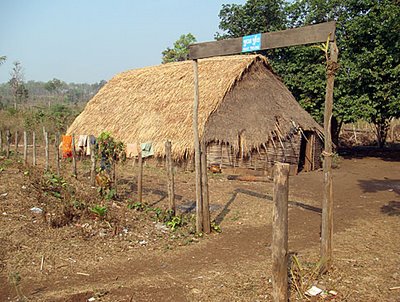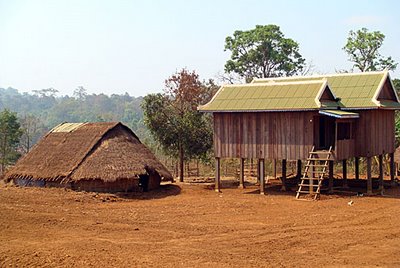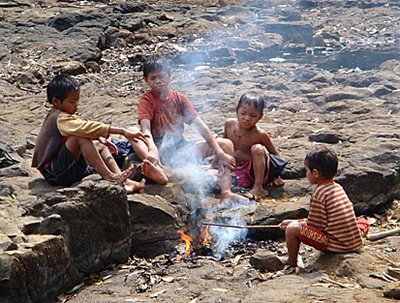The Pnong
I didn't really have enough time in Mondulkiri to get under the skin of the province, as I spent most of my time in the protected forest, which is devoid of the local population. However, I did visit a couple of Pnong villges which were located on the main roads and it was noticeable how - aside from a couple of traditional houses pictured above - little difference there is to the casual observer, between the Pnong and other rural Khmers. The following overview of the Pnong (or Phnong) is courtesy of the ELIE website.
The Phnong are the indigenous peoples of Mondulkiri, although considered a 'minority' they in fact make up the majority of the population of Mondulkiri Province. The Phnong are believed to have been living in the Mondulkiri area for around 2,000 years, they traditionally have a strong link with their natural environment, hunting in the woods around their villages as well as collecting foodstuffs and other non-food products (such as timber or tree-sap) from the woods. Traditionally the Phnong do not take products from the forests that they do not need themselves, and therefore have a minimal impact on their environment. The Phnong's religious/spiritual beliefs are animistic, this is to say that they believe all things have spirits - animals, plants, hills, stones, jars, buildings - everything. Their ancestors are also represented by spirits. If these spirits are unhappy because of some human action they can intervene in the life of the Phnong, to harm or protect them. Sometimes it is necessary to appease the spirits with ceremonies/rituals, including animal sacrifice.
The Phnong are a traditionally autonomous and self-governing society in which village elders are looked to to solve internal disputes. If it is decided that a 'law' has been broken then it may be that the guilty party would have to pay a fine to the village, and also need to carry out some ceremony as noted above. Crimes which are relatively common in the West and in much of 'developed society' as a whole - such as thefts, physical violence, rape, and murder - are practically unheard of in Phnong society. There is little documentation of the Phnong up until the French colonized Cambodia in 1864. A road was built linking Sen Monorom to Kompong Cham, though Mondulkiri remained sparsely populated (as it does today with only 2 people per square kilometer). In the 19th century the Phnong had a reputation for being particularly warrior-like in their resistance to the French army. In 1969-1970 Mondulkiri fell under Khmer Rouge control and as a consequence much of the population was displaced to Koh Nhek, where the people were forced to work in rice paddy fields. It was not until the 1980's that the Phnong were allowed to return to their villages and traditional homeland. Then they were provided with weapons to protect themselves from possible Khmer Rouge attacks. Also at this time they were told to move their villages closer to roads in order for the government to supervise their activities.
Traditionally the Phnong are essentially subsistence farmers who practice some trade with surplus products. Today this is more or less still the case, with the Phnong relying heavily on their hillside rice and bananas. For a number of reasons they have begun to diversify the crops which they cultivate and now Cashew trees, Sweet Potatoes, and other crops are becoming more popular. It has long been an ideal for the Khmer government to teach the Phnong how to "live and behave like Khmer" and this has had some success. The desire for the Phnong to be more like Khmer people - more modern - has led to a greater number of Phnong men getting jobs - ie a career - some of the Phnong men are employed in the police or army services. The small wages that these men receive - and the greater exposure to Khmer and Western culture has led to a demand for Khmer style housing, motorbikes, and electrical products such as radios and televisions. Strangely, even though it is recognised that the Phnong have occupied the lands in the region for thousands of years, they are not entitled to a legal right to their lands. This makes them extremely vulnerable to logging and land-grabbing which are becoming increasingly problematic in Mondulkiri Province.
The Phnong are the indigenous peoples of Mondulkiri, although considered a 'minority' they in fact make up the majority of the population of Mondulkiri Province. The Phnong are believed to have been living in the Mondulkiri area for around 2,000 years, they traditionally have a strong link with their natural environment, hunting in the woods around their villages as well as collecting foodstuffs and other non-food products (such as timber or tree-sap) from the woods. Traditionally the Phnong do not take products from the forests that they do not need themselves, and therefore have a minimal impact on their environment. The Phnong's religious/spiritual beliefs are animistic, this is to say that they believe all things have spirits - animals, plants, hills, stones, jars, buildings - everything. Their ancestors are also represented by spirits. If these spirits are unhappy because of some human action they can intervene in the life of the Phnong, to harm or protect them. Sometimes it is necessary to appease the spirits with ceremonies/rituals, including animal sacrifice.
The Phnong are a traditionally autonomous and self-governing society in which village elders are looked to to solve internal disputes. If it is decided that a 'law' has been broken then it may be that the guilty party would have to pay a fine to the village, and also need to carry out some ceremony as noted above. Crimes which are relatively common in the West and in much of 'developed society' as a whole - such as thefts, physical violence, rape, and murder - are practically unheard of in Phnong society. There is little documentation of the Phnong up until the French colonized Cambodia in 1864. A road was built linking Sen Monorom to Kompong Cham, though Mondulkiri remained sparsely populated (as it does today with only 2 people per square kilometer). In the 19th century the Phnong had a reputation for being particularly warrior-like in their resistance to the French army. In 1969-1970 Mondulkiri fell under Khmer Rouge control and as a consequence much of the population was displaced to Koh Nhek, where the people were forced to work in rice paddy fields. It was not until the 1980's that the Phnong were allowed to return to their villages and traditional homeland. Then they were provided with weapons to protect themselves from possible Khmer Rouge attacks. Also at this time they were told to move their villages closer to roads in order for the government to supervise their activities.
Traditionally the Phnong are essentially subsistence farmers who practice some trade with surplus products. Today this is more or less still the case, with the Phnong relying heavily on their hillside rice and bananas. For a number of reasons they have begun to diversify the crops which they cultivate and now Cashew trees, Sweet Potatoes, and other crops are becoming more popular. It has long been an ideal for the Khmer government to teach the Phnong how to "live and behave like Khmer" and this has had some success. The desire for the Phnong to be more like Khmer people - more modern - has led to a greater number of Phnong men getting jobs - ie a career - some of the Phnong men are employed in the police or army services. The small wages that these men receive - and the greater exposure to Khmer and Western culture has led to a demand for Khmer style housing, motorbikes, and electrical products such as radios and televisions. Strangely, even though it is recognised that the Phnong have occupied the lands in the region for thousands of years, they are not entitled to a legal right to their lands. This makes them extremely vulnerable to logging and land-grabbing which are becoming increasingly problematic in Mondulkiri Province.





0 Comments:
Post a Comment
<< Home